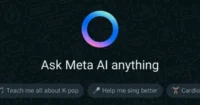Powered by Llama 3, an advanced large language model, Meta has launched a new version of its AI assistant called Meta AI. The company claims that the upgrade enables the assistant to perform better in different areas like coding, reasoning or creative writing, which makes it a strong competitor for tech giants’ products such as Google Assistant and those from smaller rivals like Mistral AI.
Meta’s suite of apps including Facebook, Instagram, WhatsApp and Messenger have the AI assistant integrated within them with a standalone website (meta.ai) for easy access. Meta AI is also faster than before; it gives more accurate responses and comes with additional capabilities supported by Llama 3. Now available in multiple countries and languages so as to reach over three billion daily active users who constitute its extensive user base.
Explanation of Llama 3 Model
Llama 3 is the most recent large language model designed to power up Meta’s improved Artificial Intelligence system. This successor has even greater skills when it comes to computer coding among other things but still can only process texts at this time even though it can handle both text and images unlike its predecessor. Multimodal text-to-image generation may be possible in future versions of this model according to plans made by meta.
Anonymous sources confirm that Llama 3 excels over other models in its category across various benchmarks, particularly in programming tasks. While people have often questioned the quality and contextual comprehension of AI systems, training with high-quality, voluminous data significantly improves their performance. This approach rectifies any mismatch between the systems’ understanding and the intended interpretation.
Features Of Meta’s AI Assistant
The following are some features delivered by Powered BY Llama Three:
Better Performance: The speed at which responses are given has been improved across different fields such as logic, coding and creative writing.
Integration: All the popular platforms – Facebook, Instagram, WhatsApp, and Messenger have integrated the assistant to provide users with easy access. Additionally, the standalone site, meta.ai, also serves this purpose.
Real-time search integration: through the Meta AI assistant one can get real-time search results from both Bing and Google which makes searching faster and easier for users.
Image Generation: Users now get better image generation capabilities with which they can create animations or high-resolution images or gif’s on the go. In addition to that, there is an “Imagine” feature where users can create images from text descriptions in real-time.
Convenience: Meta AI, now integrated into popular services like Facebook, Instagram, WhatsApp, and Messenger, enables you to access up-to-the-minute information conveniently without the need to navigate through multiple apps.
Better search capabilities: By using the Meta AI assistant for searches in real time, users can get more current results and have a better time searching.
Creative tools: The assistant has features like image creation that let users make high-quality pictures, animations and GIFs from text descriptions, which gives creative outlets to people looking for design inspiration or visual content.
Versatile use: From finding restaurants to studying for exams or planning trips and solving math problems and writing emails, users can do all this with Meta AI — which means productivity skyrockets!
Worldwide access: Meta AI is available in many countries around the world in English (for now), so people everywhere can ask it questions. This makes its an international assistant.
What might happen next?
Meta’s release of the Llama 3 and the new version of its Meta AI assistant shows how determined they are about generative AI; it also represents major investments into computing infrastructure as well as research consolidation.
By giving away their Llama models for developers to use openly while also making sure that other companies see them as competition – this move could shake up the market by bringing upstart rivals against established players who may be trying to monetize proprietary technology before newcomers like meta arrive on scene. In other words, it could change everything!
If you’re thinking “that sounds kind of dramatic,” then consider what would happen if more people started using these kinds of systems? What if they were able to understand different languages too? Would one company still have such a big head start over another when both are capable but only playing catch-up at this point?
People all over the world will profit from being able to use them with any app they want without having first learn a specific language just so it can understand what they are saying. It’s about time someone did something like this.
“Llama 3 exemplifies the marked improvement in AI systems when they undergo training on various types of data.” This could lead us towards a future where AI understands context more often than not.
One day soon, we may look back at models like these and wonder how we ever got by without them.



